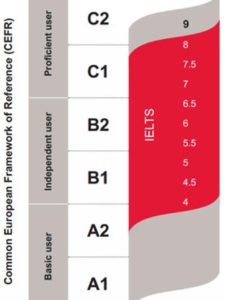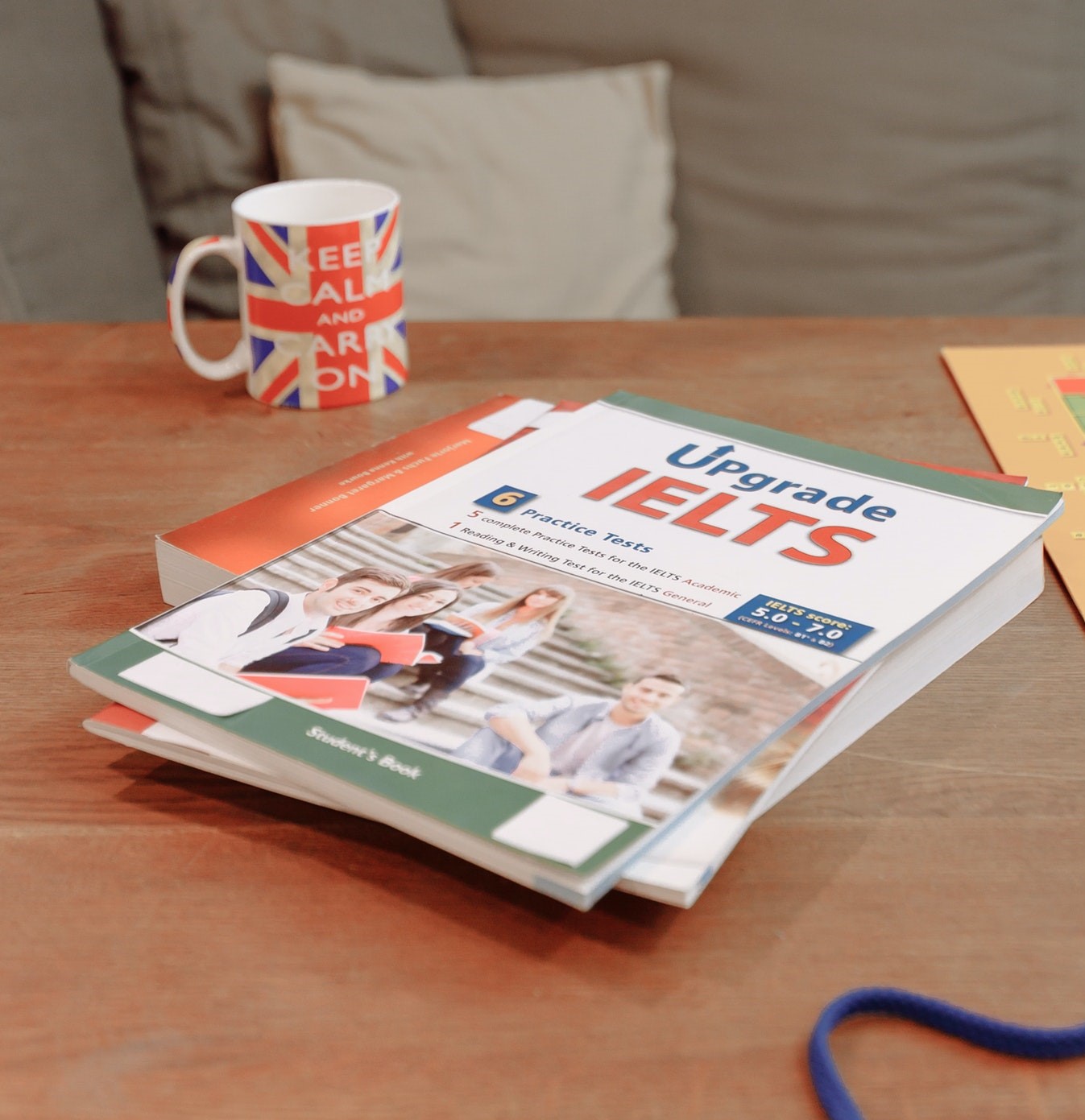Band 7 in IELTS speaking
“How can I score and get a 7 or 7.5 in my IELTS speaking exam?
This is a question I’ve been asked many times by IELTS students, and I’ll try to answer it as best I can.
Many IELTS students find themselves stuck at band 6, even after several attempts, which understandably leads to frustration and a lack of direction. This can be due to poor advice from other teachers, unprofessional feedback, or a misunderstanding of what the examiner is looking for in the IELTS speaking exam. This post might seem a little long with lots of information, but i think if you through it all, it will give you a better understanding of how to get a 7 or 7.5 in your IELTS speaking exam.
The first thing to remember is that the IELTS speaking exam is designed to assess your ability to communicate in English. According to the CERF chart below, if your English level is not above B1, you will need to work hard on using basic grammar correctly, as well as increasing your use of more advanced grammar and having a broader vocabulary.
According to the CERF chart, to score a 7 or higher, you must be at the B2 or upper intermediate level.

How your overall band score is calculated according to the British Council if you are looking on how to get a band 7 in IELTS speaking.
| Band 7 | Good user | You have an operational command of the language, though with occasional inaccuracies, inappropriate usage and misunderstandings in some situations. Generally you handle complex language well and understand detailed reasoning. |
Fluency
You are able to speak continuously most of the time with no apparent effort. However, you hesitate occasionally when thinking of a word or the correct way to express yourself.
Possibly you self-correct your language more than once or twice, when speaking more complex language.
Coherence
The flow of your ideas is easy for the examiner to follow. To some extent, you should choose to avoid speaking about the most abstract or complex ideas and this helps you to speak more coherently. You are not quite able to express yourself at the same level and the same degree of complexity as when speaking in your own language.
You show frequent usage of a good range of connective(linking) phrases and expressions. Linking words for IELTS part 3 speaking success
You show the examiner a good ability to develop your answers (e.g., adding an appropriate amount of suitable extra information or extending a discussion topic).
 Vocabulary/vocabulary range
Vocabulary/vocabulary range
To score a band 7 you have a big enough vocabulary range to hold discussions on a wide variety of topics, at some depth. However, for the most difficult Part 3 questions that the examiner may ask, (e.g., testing to see if you might qualify for Band 8), your vocabulary may be insufficient to allow you to answer with complete fluency.
-
Idiomatic Usage
You show a good knowledge of several common idiomatic expressions.
You might use a few examples of less common idiomatic vocabulary but also might use some of these with mistakes.
-
Paraphrase
You show the ability to successfully use other words to convey your meaning when you do not know the exact word that a native speaker would use or when you need to rephrase a sentence to clarify your meaning.
- Speaking Style 🗣
To get a band 7 you show the examiner you have an understanding of appropriate language style (informal/formal usage) but may occasionally choose vocabulary that is unsuitably formal, such as vocabulary that is more suitable for written English rather than spoken English.
 Mistakes/errors 😑
Mistakes/errors 😑
You only make a few more grammatical errors than a Band 8 for grammar (for example, 5 to 10 errors) but these are usually minor errors, when using the more advanced grammatical structures.
You might make a very small number of (perhaps one or two) “simple” errors such as when using irregular past tense verbs or not using the past tense when it should be used. These mistakes are often the result of old habits rather than a lack of knowledge.
You can impress the examiner with your ability to accurately produce a wide range of grammatical structures, including the most advanced structures. However, you do make some minor mistakes.
You frequently use complex sentences and show a good range of linking words to form these sentences
Pronunciation/accent
Your pronunciation is very clear and accurate almost all the time to get a band 7. The examiner never or rarely needs to ask the candidate to repeat anything. Pronunciation errors will lower your score if the examiner has trouble understanding you.
There might be one or two times when the examiner needs to “think twice” about what word you just said but it is rare for the examiner to need to ask you to repeat yourself.
-
Intonation
You show a good knowledge of how native English-speakers use intonation, i.e., a rising or falling tone, to communicate meaning.
Most of the time, you accurately place the sentence stress on the correct word in order to accurately express or emphasise your meaning.
How can i improve my score and get a band 7 in IELTS speaking?
 The speaking exam is meant to represent two people of roughly equal status communicating in spoken English. You should go into the test with a strong desire to speak freely and give information to the examiner, which should include expressing your personal feelings and opinions. These are very important pieces of information!
The speaking exam is meant to represent two people of roughly equal status communicating in spoken English. You should go into the test with a strong desire to speak freely and give information to the examiner, which should include expressing your personal feelings and opinions. These are very important pieces of information!
In addition to the points raised above, you should be eager to communicate, and naturally want to clarify what you say. In other words, you’ll want to say extra things to help the examiner understand what you’re saying. As a result, you will frequently use phrases like “In other words,…”, “What I mean is…”, and “For example,…” You should use these expressions even if you are confident that the examiner understands what you mean. By doing so, you will be able to keep the words coming out of your mouth while also earning points for the Coherence by demonstrating your ability to use these expressions.
-
Grammar
The best idea here is to practice sentence-making in the weeks and months leading up to your test, developing your sentence-making habits, and then, on the day of the test, don’t worry too much about whether your grammar is correct or not. Instead, try to speak automatically, focusing on communicating your ideas and trusting in the sentence-making habits you’ve worked on and practiced in the months you spent preparing for the test. I’m not saying that you shouldn’t worry about your grammar during the test, but don’t just focus on it too much because it will slow you down, and try to find that balance.
-
Vocabulary
-
Answering a difficult question/topic
 If you get a difficult question where you can’t think of many any ideas or you have little knowledge about the topic, you must still try to keep talking! What can you say? You can first say that you have no ideas or knowledge and then follow that by trying to explain why or how this is the case or you could follow by saying what you do know about the topic.
If you get a difficult question where you can’t think of many any ideas or you have little knowledge about the topic, you must still try to keep talking! What can you say? You can first say that you have no ideas or knowledge and then follow that by trying to explain why or how this is the case or you could follow by saying what you do know about the topic.
Don’t forget that it is acceptable to tell lies, especially in Part 2. This situation is a perfect example of a suitable time to state your feelings or opinions about something, even when the original question was asking for information and help you to get a band 7 in your speaking exam. Read more How to speak in part 3
“What’s the meaning of life?
“Wow! I really have no idea on this…. Let me think…. Well, maybe life is about being happy, healthy and being with family. Mind you, some people might say the meaning of life is all about success, and making a lot of money to lead a comfortable life.”
Many IELTS candidates lose fluency points in Part 2 because they simply can’t think of something to say quickly enough. A good way to avoid long or unnatural silences in Part 2 and in all parts of the Speaking test is to speak your thoughts. For example, in Part 2 you could say things such as;
“Let me see …”, “What else can I tell you about Bill Gates?”, “What else is there?”, “What have I forgotten to mention?”, “Is there anything I’ve forgotten to tell you?”, “Let me see if I can recall anything else about that village i visited.” etc. Then you can follow that with, “Oh yes!” or, “Oh, that’s right! We also bought a few traditional souvenirs in the village .”
Remember that part 2 of the speaking exam is not a speech, and you should be talking like in a general relaxed conversation. Imagine that you meet up with one of your friends on a Monday morning, and you are talking to your friend about your weekend. You start by telling your friend that you went to the cinema on Saturday night to watch a new movie.
Now you tell your friend, what the movie was, where you watched it, who you went with, what it was about, and you explain to your friend how you felt about this movie. 🍿
Notice how that is just like an IELTS speaking part 2 topic card, and now think about how you would talk to your friend about this topic, and understand that this is the way you should be talking to the examiner in your speaking test.
See more on part 2 IELTS part 2 topic card success and IELTS speaking part 2 topic practice and Understanding the IELTS speaking part 2 topic card
-
Speed
 In the IELTS speaking exam you should not try to speak unnaturally fast, or speak like you are in a rush to get it finished with. The best way to prepare yourself for this is to practice speaking a little faster at home, recording yourself speaking, and then playing it back and listening to your speed compared to a native speaker. Your speed will also be affected by your ability to use contractions, and linking the sounds of your speech.
In the IELTS speaking exam you should not try to speak unnaturally fast, or speak like you are in a rush to get it finished with. The best way to prepare yourself for this is to practice speaking a little faster at home, recording yourself speaking, and then playing it back and listening to your speed compared to a native speaker. Your speed will also be affected by your ability to use contractions, and linking the sounds of your speech.
“I am a person who has not had an easy life.
“I’m a person Who’s life hasn’t been easy.
By using contractions you will notice how your speed of speech naturally increases.
Summary
If after reading and understanding everything that has been written above, you must now put it all into action. and aim to get a band 7 in IELTS speaking. Speaking with a speaking partner is the most effective way for you to improve your fluency. This is far more interesting and effective than simply speaking to your bedroom wall.
Don’t be concerned about speaking grammatical errors when chatting with a speaking partner . You can improve your grammar by recording yourself as you speak, then playing it back later on, and listening for any mistakes or bad habits.
When you get up every morning, before brushing your teeth, practice speaking into the mirror, and talk about what you are going to do for the day.
“I am going to go to class.
“I will have lunch at about 12 o’clock.
“I’m going to meet my friend for a cup of coffee in the afternoon.
Note the tense and grammar you should be using here.
 Before you brush your teeth at night, practice a few sentences into the mirror again. This time talk about how you spent your day, which will of course be all in the past tense.
Before you brush your teeth at night, practice a few sentences into the mirror again. This time talk about how you spent your day, which will of course be all in the past tense.
If you’re being serious about your preparation it’s indeed a good idea to think of some one 2 one classes with an IELTS tutor. The first class should give you some feedback on the most fundamental things you need to work on, leading up to a practice or mock IELTS speaking exam, where with some hard work you can achieve your target, and get a band 7 in IELTS speaking.
Read more on how to get the IELTS speaking score you need
My 10 Tips for IELTS Speaking Success
Linking words for IELTS part 3 speaking success
IELTS speaking part 2 topic practice
What not to do in part 2 of IELTS speaking exam



































